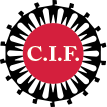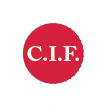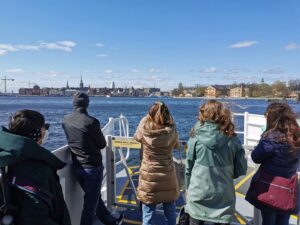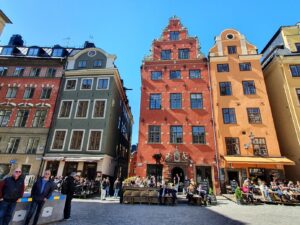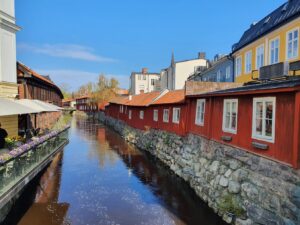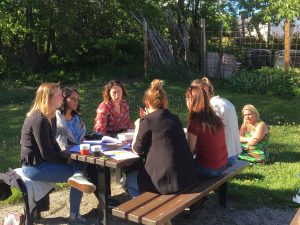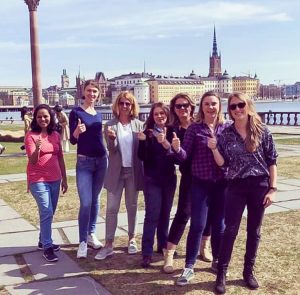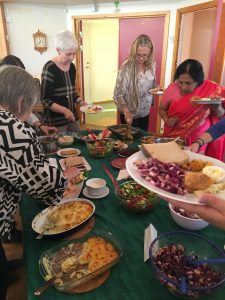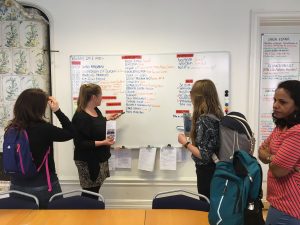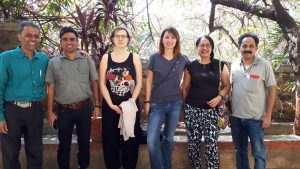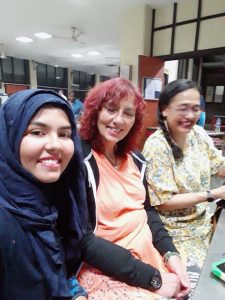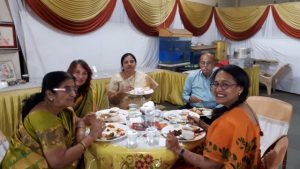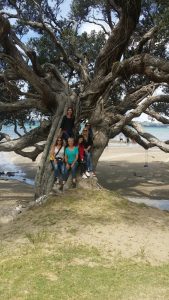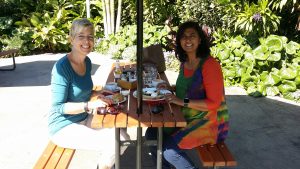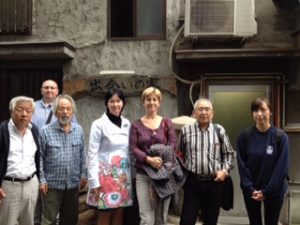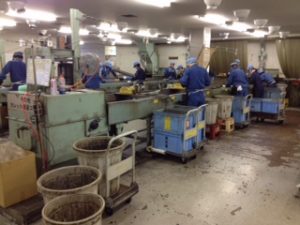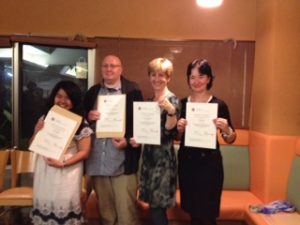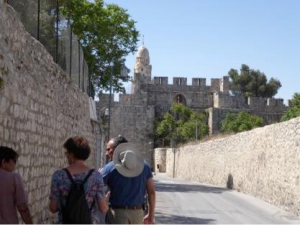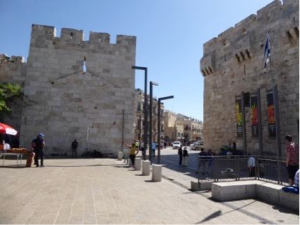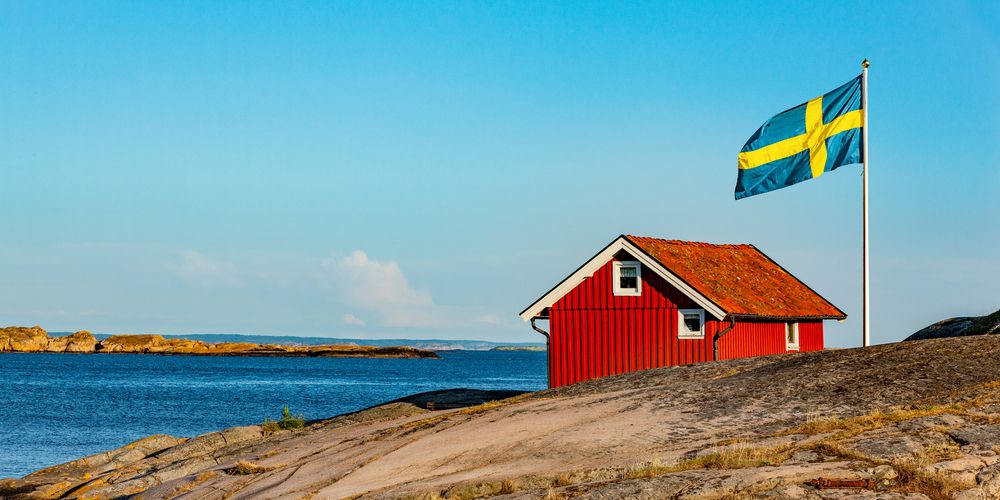
Blog
In this blog participants tell about their experiences in the exchange programms
A Dutch participation in Sweden (Corinne, 2022)
In April 2022 my exchange program to Sweden started. I had chosen the country Sweden because of its nature and culture. Until that moment I only knew Sweden from holidays. I was also very curious about the social work in Sweden, which made this exchange trip a unique opportunity. Three other female participants also took part in this program, two social workers from Spain and one from Italy. In the months before the exchange program, it was still uncertain whether the program could take place due to the COVID peak in the winter but towards springtime the perspective became increasingly sunny and almost all COVID restrictions disappeared.
After several online meetings we met for the first time in real life at the hostel in Stockholm. A short time after our first dinner together, it turned out that COVID had not disappeared; one of the Spanish participants had a COVID-infection. This made the CIF program suddenly uncertain again. We were also about to go to our host families at that time. The question was whether we could still go there. After taking COVID self-tests and several phone calls, the good news came; there were no further infections and we were very welcome at the host families. The Spanish participant initially had to remain in quarantine at the hostel, but fortunately she did not feel ill. After a few days she was able to go to the meetings too.
My host family in Stockholm was a married couple. The woman worked as a youth care manager and the man was retired. Two very sweet people with lots of love for culture and nature. The theoretical program in Stockholm consisted of an average of two or three lectures a day. Every day a CIF member personally guided us. The meeting at the Barnrättsbyrån was very inspiring; this is an organization that stands up for the rights of children and adolescents. Among other things, this organization investigates the safety of children in institutions. The meetings at Akademikerförbundet (union for social workers) and Enheten för hemlösa (organization for homeless people) were also very interesting. This showed that Sweden invests a lot in helping families and individuals. A good example is the Housing first programme, in which homeless people are first given a home from where they can start to build their future. In my opinion, Sweden serves as an example for many other countries. On the other hand there are also challenges that are comparable to the Netherlands, such as a high workload and high staff outflow within the youth care. Because Sweden is also a large country (eleven times the size of the Netherlands), and because (health) care is often organized on a municipal or regional level, there are local differences in the quality of (health) care and budgets.
After more than a week in the dynamic city of Stockholm, I travelled 100 kilometres towards the west, to Västerås. As a girl from the countryside, I quickly felt at home there, because it was some quieter than in Stockholm. Once again I met a very sweet host family; a woman who worked at the hospital, a retired man and their large dog. In the evening, the man cooked ‘svensk husmanskost’, very tasty traditional Swedish meals. In Västerås, the CIF program was more practical. It gave me many insights about the workplaces. For me the visit at a skolkurator (school social worker) was very interesting. Over there I heard personal stories from children with psychological problems and how their skolkurator assists them. The visit to the Barnahus (collaboration between the police, youth care and the Public Prosecution Service) was also very interesting. This organisations work together as a team, which is very unique.
In addition to all the lectures and working visits there was also time for relaxation. For example: my host family from Stockholm took me to a performance at the music university and we took a ferry to the island of Vaxholm. With the host family from Västerås we went on a weekend trip to friends in the forest and we made beautiful walks. In addition to all the work-related knowledge I have also been able to learn a lot about the Swedish language and culture. Living with the host families has therefore been of great value to me, because it ensures that you can fully immerse yourself in daily (family) life in Sweden.
Some people say that the Swedes can be a bit distant and hesitant. I, on the other hand, noticed that the Swedes are very cordial, warm and kind. Especially when you get to know them better. I felt very welcome in the host families and the CIF organisation. Highlights for me were the meetings, such as the welcome brunch in Västeras and the farewell party in Stockholm.
It was very special to experience the beginning of spring twice. When I left the Netherlands, spring had already started here. Because it was a bit colder in Sweden, spring was just getting started there when I arrived. This was marked by the blooming of the beautiful cherry blossom at Kungsträdgården in Stockholm and the traditional spring festival of Valborg. Valborg is celebrated with bonfires, as it marks a tipping point. Winter becomes spring. Old becomes new. That’s how the trip to Sweden felt for me too. The meetings and the enormous hospitality of the Swedes have made an unforgettable impression on me. It has enriched and changed me both professionally and personally. Tusen tack, CIF and host families!
A Dutch participation in Sweden (Inge Belderbos-Jansen, 2019)
My name is Inge Jansen (50) and I work as a process manager Care & Security at the municipality of Borne in The Netherlands. I started my career as a police-officer in 1989. The last 6 years of my police career, till 2008, I participated in a team with specially trained police officers in domestic violence. After a while I noticed that I preferred to work more preventive, so I started social studies at the Saxion University in Enschede. During this study I quit my job as a policewoman and became a social worker at the Raad voor de Kinderbescherming (child protection/ministry of justice and security) and continued working with domestic violence families and children who got (emotional) neglected or abused.
I believe it’s always important to develop yourself personally as well professionally. As a teenager I spend one year in Los Angeles as an exchange student. Living at a host family, making new friends and going to high school was a great experience which I still cherish. Nowadays my husband and I like to travel and meet different people worldwide. We are interested in other ways of life, work and culture. I am convinced that traveling and meeting other people increase understanding and tolerance.
So, when I heard about The Council of International Fellowship (C.I.F) I became enthusiastic right away. An international exchange program for social workers, that’s amazing!
I choose for an exchange to Sweden because the Dutch government copied their youth system in 2015. The Dutch municipalities became responsible for the (youth) care. Besides that we have the same thoughts about vulnerable people who should participate in the society. Because I work at a municipality in The Netherlands it was very instructive to learn about the way they work in Sweden. When I applied I wrote about my work experiences and my learning targets during my exchange in Sweden. I wanted to learn more about the way Sweden deals with domestic violence situations and complex divorces. In The Netherlands there is a 57% recidivism of the domestic violence cases and the number of complex divorces is increasing. Many children get involved in the battle of their parents which is very harmful for the development of children.
On April 26th 2019 I went to Sweden to participate in the Swedish exchange program which took 4 weeks. The other participants came from India, Romania (2), Germany (2) and Russia.
The first two weeks we spend in Stockholm. During the first weekend we presented ourselves to each other. It was very interesting to get to know more about each other’s personal life, work and culture.
During our stay in Stockholm we had visitations at National, region and local level, like the parliament, the Ministry of Health and Social Affairs, the city hall, the Fountain house, The Hedenbro Institut (using the Dutch Marte Meo method) and the initiatives for refugees and unaccompanied minors. It was very remarkably to see all the effort Sweden makes to treat everybody equal and to enable them to participate in society. In 2015 Sweden got confronted with 35.000 unaccompanied minors. Nowadays it is still a big challenge to place all the newcomers in network homes.
The last two weeks I went to the municipality of Jönköping. There I learned more about my professional goals. The Swedish social workers in youth care experience, just like in The Netherlands, a high pressure and have to deal with complex and unsafe families. I told them about the ‘Tijdelijk Huisverbod’ method (‘Temporary Home Prohibition’), a sanction from the mayor which ensures that a domestic violence perpetrator has to leave the house for at least 10 days. Social workers, police and the women shelter were very interested in this jurisdiction.
Recently I got invited by the Sveriges Kommuner och Landsting (SKL) to give a presentation about the Dutch approach concerning Domestic Violence.
In Jönköping I visited the barnahus (children’s house) which is a child friendly, interdisciplinary and multi- agency centre for child victims. The children get interviewed by trained police officers and medically examined for forensic purposes. Justice can watch the interview live in a separate room. During this process the children get assistance from a social worker and a psychologist. All the professionals there work together in one building in the interest of the children.
Complex divorces, parents who fight long and intense, seem less common in Sweden. Maybe the Swedish parents are more peaceful. Parents have together 480 days of parenting leave after a child is born. Fathers are much more involved in the upbringing off the children. Besides that day care, warm meals at school and parenting courses are free of charge, as well as adult education.. Men and women can always continue to devop themselves. After a divorce it’s common that parents have a 50-50 arrangement about their children. They hardly know partner alimony and when a parent does not pay the cost of the child, the government will do so and reclaim it later off the parent.
During the 4 weeks I stayed at 4 host families who offered me the great opportunity to be a part of the Swedish family life. Swedish families are social, friendly, interested and very much aware of the environment. Children play a lot more in nature and are used to play outside and respect the environment.
It was a great experience which I also cherish. I’m still in touch with my host families and professional information exchange still continues. We keep each other informed and try to develop each other.
A dutch participant in India (Ingrid Richardson 2019)
As of Januari 7 to 26, 2019 I participated in the CIF-India professional Exchange Programme with 3 other participants from Italy,Estonia and Germany.
The first week we stayed at TISS Guest house, Tata Institute of Social Sciences, Chembur Mumbai. This was a very pleasant campus to stay. There were a lot of foreigners and the students were international oriented. In the canteen there was no shyness to approach us and start a conversation. Afterwards I even receives an App from a student we met inquirering into our where about with the intention to help us or spent some time with us. The openhearted and spontaneous approach felt like a warm blanket wrapped around me.
On 7th January we had TISS-registration, Inauguration and Country presentation. It was a ceremony with lightening of candles. The dresses of de ladies were fabulous. After lunch we did our country presentations and learned a lot in an interactive way.
From 7th to 11th off January our orientation programme started with lectures in the morning and after lunch. Nearly all evenings we had invitations for dinner at one of the CIF-India members house and sometimes also in a restaurant with their families and friends. We got a very good theoretical insights of the followings themes: Working with children in a clinic setting, Children in need of care and protection, Women in distress, Livelihood schemes for urban poor especially women, Social work in India and International Social work, Political system in India, Situation of children in India, Mental health situation in India, Corporate Social return in India.
These lectures laid the bases for the second part of the programme when we went to visit the agencies. All four participants followed the same programme that was day by day guided by a member of CIF-India. There was enough moments of interactions about the different contexts India versus Europe. Also de differences between the European countries like the Netherland, Italy, Germany and Estonia. All lectures were very engaged in the work they do and willing to share information with the participants. All four participants had as professional work field Child, youth and families care. Prostitution is not legalize in India as in the Netherlands, the women work in poor conditions and so does their children. We got more insights in de cast system of India and how each cast is also structured in hierarchy. A lot of social work is done by NGO’s without funding or policy of the local or federal government.
On Sunday the 13th of January we changed from TISS guest house to different host families. The host families played a great role in our adjustment in Mumbai. We could talk the day over with them, address uncertainties and look for options. They also guided us around the system of public transport. My greatest connection with my host family was our mutual interest in Yoga. I had some early walks and practice with them in the parks. At a certain moment I had the same taxi-driver waiting next to the park and driving me to the VT-station where I took the train to my appointments. The greatest adventure I had with the taxi is that a to me unknown woman got into my taxi drove herself to the museum, stepped out without paying and sneer at me “Tank you for the free ride”. I could only laugh for so much bravery!
The visit to the rural area was very impressive! We stayed in an orphanage. Had dinner and breakfast with the children and attended an adoption. Having a fare skin or being a boy will determine if a child will get an adoption family and in which timeline. Some of the children will be adopted in India and others will get foreign parents.
All people we met and institution we visited gave us the opportunity to peep into their kitchen.
I learned how to be patient and appreciate the organic way of organizing. The most valuable skill I sensed is the personal way Indian members approached us. Every night the president will call and inquire about our wellbeing. I felt seen and appreciated, for this I want to thank them all
Een Nederlandse deelnemer in Nieuw Zeeland (Hetty Nijmeijer, 2018)
De eerste volle week zit erop. Begonnen met lessen op de universiteit over social work en wat geschiedenis gezien de koloniale overheersing van Groot Brittannië. Verschillende organisaties bezocht zoals het ministerie voor kwetsbare kinderen Oranga Tamariki. Veel zaken worden in zowel Engels als Maori aangegeven. Voor veel Nieuw Zeelanders is de treaty die door de Engelsen gesloten is met de Maori een groot goed. De treaty had weliswaar twee mogelijke interpretaties en zorgde voor verdeeldheid, tegenwoordig is in de wet opgenomen dat de rechten van Maori gerespecteerd moeten worden. Tijdens bezoeken aan organisaties wordt er dan ook vaak naar verwezen. Zo is het voor Maori mogelijk naar een Maori rechter te stappen. In zorg zijn er meestal Maorimedewerkers die Maoricliënten kunnen begeleiden. Maori werden lang als tweederangs burgers beschouwd. In de ’60 was er zelfs nog een zekere apartheid. In de bioscoop bijvoorbeeld zaten Maori boven, de Europeanen beneden. Tegenwoordig bestaat de Nieuw Zeelandse populatie uit een mix van diverse immigrantengroepen. Ik mis een nationale gezamenlijke cultuur. Ik heb het idee dat er veel verzuiling is.
Elke dag ontmoet ik wel ergens Nederlanders, sommigen zijn hier al 45 jaar anderen net 2 jaar. Niemand wil terug naar Nederland. Met name omdat het in Nieuw Zeeland zo gemoedelijk toe gaat. En dat is zeker ook mijn ervaring. Het is rustig, easy going. Zelfs in Auckland, toch een stad van 1.5 miljoen inwoners, is er niet het gevoel van een grote drukke stad, niet de gehaastheid.
Waar de Nederlanders wel tegen aan lopen, is dat ze wat terug in de tijd zijn. Veel zaken op sociaal gebied zijn nog niet ontwikkeld, bijvoorbeeld zorgboerderijen zijn hier nog onbekend.
Inmiddels ben ik bijna in New Plymouth gearriveerd waar het tweede deel van het programma plaats zal vinden. Ben benieuwd!
A Duth participant in Japan (Conny van der Aalsvoort, 2017)
We are more alike than we thought.
Since Friday the 6th of october I am staying in Kyoto, Japan, on an CIF Exchange and I would like to tell you about my first experiences, because I am so happy to be part of CIF Japan!
Untill now everything has been great and I am sure that the second week will feel the same.
With me are collegues from Estonia, Thailand and USA and the first night we were welcomed with a very nice dinner in a traditional Japanese restaurant. Off course the tatami mats take some getting used to, but luckilly I have many years of yogatraining so I am still quite flexibel.
The boardmembers of CIF Japan and their helpers are all very kind and we had nice conversations about all sorts of things. The next day we were invited to a center where disabled persons are helped and also work in the lunchroom. The manager is a CIF boardmember and he gave an overview of the program for the coming two weeks. Then our hosts came to pick us up and I met mrs. Nasu for the first time. Both she and her husband are not only very kind and inviting to me, but we also have very interesting conversations and discussions about different subjects. I feel very fortunate to have them as my hosts. They speak English well and are themselves broadly interested. Having traveled to Europe often and also having been hosts for foreign students for many years, they have a European feel to themselves and I don’t feel any culturele gap.
The CIF program of the first days took place at the university and we had very interesting lectures about demographic analyses and social problems in Japan. We met with students and professors and again, we have an interesting exchange of ideas and experiences every day. And these talks and exchange of ideas continue during lunch and dinner, wether with people from the university, other CIF participants or the hosts.
After the first days of lectures and seminars at the university we visit Osaka for two days on a row for our first fieldvisits.
The first day we visit an organisation that helps people with a HIV infection and a foreign background. After that an organisation that helps LGBT. The second day we visit many organisations that help homeless people and a factory where mentally disabled are working. Everything is new and interesting. We see a sight of Japan that is unknown to Europeans, but also to many Japanese.
During the weekend, CIF Japan has also thought about a cultural program: we are taken to the most famous temples of Kyoto and they have even arranged tickets for a Sumo game. Very exciting!
The second week is full of visits in Kyoto city itself: elderly homes, daycare for elderly, for children and for disabled persons. Then we visit a hospital and also witness two conferences with a group of social workers, nurses and doctors who discuss the next steps to be taken for their patiënt. One of them is a 100 year old lady, still living at home, with her daughter who takes care of her.
It is very special to us, to be able to get so close to the work and thoughts of these workers. Everyone is very open and inviting and wants to take the oppurtunity to learn from each other.
The most impressive things of all are the kindness and openess of the people of Kyoto. How did we get the idea in the Netherlands that Japanese people are strict and formal? That they work too hard and don’t relax. Maybe we are lucky because we meet many elderly people who have more time to take the oppurtunity to talk with us, but also the younger people that are active for CIF Japan know how to relax and have fun. In many ways I have experienced the Japanes not to be very different from the Europeans. Both in their free time and in their work. Also in the way the work is organised I see a lot of similarities. In a way it is dissapointing: I get less new ideas from it than I had expected. For instance: I saw no new technologies or robots! On the other hand it is comforting: maybe the way we are working as social workers is similar all over the world because of good reasons. Because these are the best ways. To check if this is true I think I should visit more CIF programs in the coming years. I am already looking forward to it!
* The people I met during a fieldvisit
* A sign ’take care of the elderly”
* Workshop processing waste, where people with limited possibilities work
* The four CIF participant with their certificates after having succesfully finished the Japanse CIF program
=========================================================================
A Duth participant in Israel (Salima Senders 2017)
Where it was 2 degrees and snowy at the airport from Munich, I landed a couple of hours later in Tel Aviv in the summer: a nice breeze and about 25 degrees! CIF members Hanaa and Ruthi warmly welcomed me. Hanna brought me to the bus stop to Jerusalem. Less than an hour later, I was in Jerusalem, where Ruthi was waiting to bring me to the hotel, where all the four participants where going to stay for the first days in Israel. Bhavne from India was already there and shortly after that came Agneta from Sweden.
Barbara from the States had unfortunately a delay and would arrive soon as possible. Dorit, the long-term CIF-friend of Agneta picked us up in the evening, to go to the Wailing Wall where it was very crowded and after that we were invited at her home for the Shabbat meal, together with her husband and mother. Celebrating the Shabbat was special for all three of us, never having this experience before.
The next morning we were picked up for a tour through the old city of Jerusalem. We have seen the wailing wall again, which we could see more nearby, the Armenian Quarter, some churches and the Arabic Souk. It was so special to all of us. Again in the hotel we could have a little rest and than the Welcome party started in our hotel.
It was so nice how everybody welcomed us, Edna, the chair person of CIF Israel, made a speech and after that we had a meal together with delicious dishes everybody had made. We,the participants, did our presentations. And then, whes the first meeting was almost finished, Barbara arrived at the hotel too. So now we where complete, the other members said goodbye and we went to sleep.
On Sunday we had at 10:00 an orientation meeting at the Welfare Ministry, where we met the director of the department for International Relations at the Ministry of Social Affairs and Social Services. We told about our work experiences and she gave a presentation of her work and about special issues with minorities. It was interesting to hear about, how ´young´ Israel is as a nation. After this meeting we went to the oriental market and had lunch in a typical Israelian restaurant. In the afternoon we went to a workshop in a wonderful green garden together with the partners from a peace-project. We had a lively discussion all together and in the evening we went to Tel Aviv for the Memorial Ceremony. However, it was not possible to get in, when we arrived, because it was to crowded. We waited for a while, trying to find a way, but than we returned to Jerusalem again.
These are some of my impressions during the first days of my CIF program in Israel.
=============================================
A German participant in the Netherlands (Veronica Weidel 2016)
I am a social worker from Germany who works in Children’s Services. A fellow colleague told me about the CIF exchange programme. Due to the fact that I lived and worked as a social worker in England for many years, I became interested in the CIF programme. I only knew the Netherlands from family holidays about 20 years ago. It was time for me to go back. This time I wanted to know what the social work system is like in the Netherlands. On the first day I met my fellow participants Emel from Turkey and Vagia from Greece. We stayed in a holiday apartment in Amsterdam where we were welcomed by the CIF members from the Netherlands.
The programme was divided into two parts. The first week our programme took part at the university. We met up with other social work students and had lectures which focused on the Dutch social work system and outreached working. At the university we had to do our own presentation about the social work system in our country. We also talked to the students about our work. The students organised visits to different organisations and agencies which offered outreached work to the people of Amsterdam. I liked the neighbourhood centres, e.g. we visited a centre which offers support for people with mental health problems to integrate them in the community. People are encouraged to give ideas what the centre should offer. In this case the centre provided computers so that people can write application for jobs. When people started to have technical problems they developed a “repair shop” for laptops. We also went to homeless shelters and a newspaper which is sold by homeless people. At the end of the first week we met with the students and their teachers for a meal in a community centre.
In the second week we left our apartment to live with our host families. Emel went to a host family in Nijmegen while Vagia and I each went to stay in our own host family in Amsterdam. My host was a Dutch woman called Ineke. I enjoyed staying with her. We went to the Amsterdam Museum where I learned a lot about the history of Amsterdam. Ineke took me to Marken, a small village near Amsterdam, to show me the beautiful countryside of the Netherlands. Unfortunately it started to rain and it was very windy. There was a nice café where we enjoyed delicious Dutch pancakes and hot chocolate.
My programme during the second week was focused on the work I do in Germany. I visited agencies to do child and family work to prevent that child is going into care. I visited a Domestic Violence Unit which takes all the referrals regarding child and adult protection. Depending on the outcome of the assessment they referred it further to other agencies which support families, or to the Child Protection Council which can asked the Court to remove the child.
During the programme I realised the social work systems in Germany and the Netherlands are similar in terms of child protection. There are some differences in how services are run. In Germany Children’s Services has the responsibility in safeguarding children as well as offering support and coordinating support packages. In the past couple of years the central government in the Netherlands gave the responsibility to local government to provide services for people in need. This means that there are agencies who offer different support packages. It also creates uncertainties because the agencies depend on the funding from the local government.
I met Emel and Vagia again at our CIF Farewell Party in Utrecht, where we talked about our experiences. I would like to thank everyone at CIF Netherlands for organising our programme and supporting us during that time. I definitely will come back to the Netherlands.
================================================================
Een Nederlandse deelneemster in Japan (Hélene Vollaard, 2015)
Cultuur is bepalend voor wat werkt
Nadat ik van een collega over de CIF programma’s had gehoord, besloot ik om me op te geven voor het programma in Japan. Japan organiseerde in 2015 voor het eerst een programma met als hoofdthema ouderenwerk. Met mij namen nog twee participanten deel, Tuija uit Finland en George uit Zweden. De participanten moesten geïnteresseerd zijn in allerlei soorten van sociaal werk. Ik werk met dak en thuislozen, verslaafden en mensen die overal vandaan komen en in Nederland hun plek nog niet hebben gevonden. Ik geef dagelijks leiding aan de maatschappelijk werkers en bepaal mede de inhoud van het programma Hulpverlening. Ik denk wel eens dat mijn team het meest multiculturele is dat er kan zijn: we spreken 16 talen en komen net als de doelgroep uit alle windstreken. Japan heeft nauwelijks buitenlandse inwoners. Het was dus moeilijk voor CIF-Japan om een programma voor me te maken, maar het is hen wel gelukt. Ik kwam terecht bij de hulpverlening aan daklozen en verslaafden. Hun problemen en ook de aanpak komen overeen met die in Nederland. Daarnaast nam ik ook deel aan het programma van mijn ‘collega’ s ’. Het was interessant en verrijkend om meer te leren over hoe men in Japan met het groeiende probleem van vergrijzing omgaat.
Het programma was goed georganiseerd en heel vol. Japanners werken hard en wij dus ook. Het bijzondere van het CIF programma vind ik het leven in een gastgezin en dat was ook mijn meest waardevolle ervaring. Hoewel het eerste gastgezin dat niet was, dat was eigenlijk een soort Bed en Breakfast. CIF-Japan handelde snel toen ik dit aan hen vertelde en verplaatste me naar een heel hartelijk gezin waar ik een geweldige tijd had, samen met Tuija die daar ook woonde. Mijn gastgezin komt in de zomer naar Nederland en ik zal hen dan weer ontmoeten.
Veel heb ik geleerd over Japan en de Japanse manier van leven. Het land is heel schoon en bijna beklemmend netjes. Het is bijvoorbeeld ‘not done’ om te eten op straat. Iedereen is uiterst vriendelijk en behulpzaam, maar de afstand tussen medewerkers en hun baas is daar veel groter dan bij ons. Dat schept wel duidelijkheid over de verhoudingen die veel groter is dan hier, waar vaak geen helderheid of zekerheid is over ieders rol.
De enige migranten in Japan zijn Filippijnen en Koreanen, vooral vrouwen die in het huishouden werken of nanny zijn: dit is ongeveer 2% van de bevolking. Het (nog) niet opnemen van mensen uit andere landen en met een andere etnische achtergrond gaat waarschijnlijk wel problemen geven, omdat Japan vergrijst en er binnenkort te weinig mensen zullen zijn om te werken en voor de ouderen te zorgen. Aan dit gegeven is veel aandacht besteed tijdens de werkbezoeken en al werd dit niet zo direct benoemd was dit voor ons Noord Europeanen snel bedacht.
De vrouw leeft nog steeds in de schaduw van de man, is als persoon minder zichtbaar en wordt minder bij dingen betrokken. Dat gebeurt heel subtiel, eigenlijk als vanzelfsprekend en werd ook door mij soms gevoeld door een verschil in de behandeling van mijn collega’s en mij.
Deze ervaring heeft me veel geleerd. Een van de belangrijke dingen is dat de aanpak van problemen niet zonder meer uitwisselbaar is, want de cultuur is bepalend voor wat werkt. Je kunt dus ‘evident based programs’ niet zo maar gebruiken in een ander land. Uiteraard heb ik ondanks het verblijf in een gastgezin, vooral de buitenkant van Japan meegemaakt. En dat was erg waardevol!
